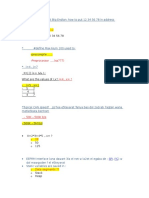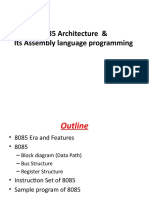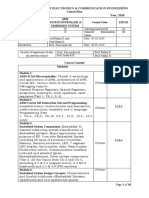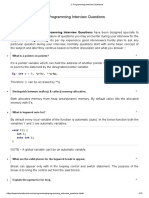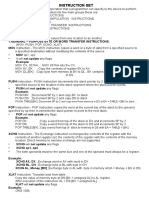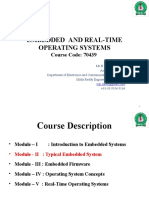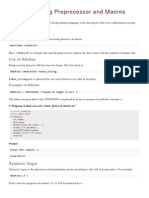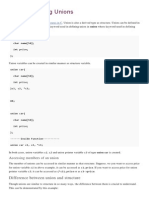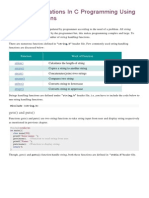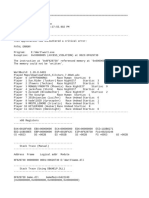Bitwise Operators
Uploaded by
slspaBitwise Operators
Uploaded by
slspaBitwise Operators
Bitwise operators are special types of operators that are used in programming the processor. In processor,
mathematical operations like: addition, subtraction, addition and division are done using the bitwise operators
which makes processing faster and saves power.
Operators
Meaning of operators
&
Bitwise AND
Bitwise OR
Bitwise exclusive OR
Bitwise complement
<<
Shift left
>>
Shift right
Bitwise AND operator in C programming.
The output of logical AND is 1 if both the corresponding bits of operand is 1. If either of bit is 0 or both bits ar e
0, the output will be 0. It is a binary operator(works on two operands) and indicated in C programming
by & symbol. Let us suppose the bitwise AND operation of two integers 12 and 25.
12 = 00001100 (In Binary)
25 = 00011001 (In Binary)
Bit Operation of 12 and 25
00001100
& 00011001
________
00001000
= 8 (In decimal)
As, every bitwise operator works on each bit of data. The corresponding bits of two inputs are check and if both
bits are 1 then only the output will be 1. In this case, both bits are 1 at only one position,i.e, fourth position
from the right, hence the output bit of that position is 1 and all other bits are 0.
#include <stdio.h>
int main()
{
int a=12,b=39;
printf("Output=%d",a&b);
return 0;
}
Output
Output=4
Bitwise OR operator in C
The output of bitwise OR is 1 if either of the bit is 1 or both the bits are 1. In C Programming, bitwise OR
operator is denoted by |.
12 = 00001100 (In Binary)
25 = 00011001 (In Binary)
Bitwise OR Operation of 12 and 25
00001100
| 00011001
________
00011101
= 29 (In decimal)
#include <stdio.h>
int main()
{
int a=12,b=25;
printf("Output=%d",a|b);
return 0;
}
Output
Output=29
Bitwise XOR(exclusive OR) operator
The output of bitwise XOR operator is 1 if the corresponding bits of two operators are opposite(i.e., To get
corresponding output bit 1; if corresponding bit of first operand is 0 then, corresponding bit of second operand
should be 1 and vice-versa.). It is denoted by ^.
12 = 00001100 (In Binary)
25 = 00011001 (In Binary)
Bitwise XOR Operation of 12 and 25
00001100
| 00011001
________
00010101
= 21 (In decimal)
#include <stdio.h>
int main()
{
int a=12,b=25;
printf("Output=%d",a^b);
return 0;
}
Output=21
Bitwise compliment operator
Bitwise compliment operator is an unary operator(works on one operand only). It changes the corresponding bit
of the operand to opposite bit,i.e., 0 to 1 and 1 to 0. It is denoted by ~.
35=00100011 (In Binary)
Bitwise complement Operation of 35
~ 00100011
________
11011100
= 220 (In decimal)
Twist in bitwise complement operator in C Programming
Output of ~35 shown by compiler won't be 220, instead it shows -36. For any integer n, bitwise complement
of n will be -(n+1) . To understand this, you should understand the concept of 2's complement.
2's Complement
Two's complement is the operation on binary numbers which allows number to write it in different form. The 2's
complement of number is equal to the complement of number plus 1. For example:
Decimal
Binary
2's complement
00000000
-(11111111+1) = -00000000 = -0(decimal)
00000001
-(11111110+1) = -11111111 = -256(decimal)
12
00001100
-(11110011+1) = -11110100 = -244(decimal)
220
11011100
-(00100011+1) = -00100100 = -36(decimal)
Note: Overflow is ignored while computing 2's complement.
If we consider the bitwise complement of 35, 220(in decimal) is converted into 2's complement which is -36.
Thus, the output shown by computer will be -36 instead of 220.
How is bitwise complement of any number
N=-(N+1) ?
bitwise complement of N= ~N (represented in 2's complement form)
2'complement of ~N= -(~(~N)+1) = -(N+1)
#include <stdio.h>
int main()
{
printf("complement=%d\n",~35);
printf("complement=%d\n",~-12);
return 0;
}
complement=-36
Output=11
You might also like
- Microcontroller Systems (KON 309E) : Lecture Notes (WEEK 1)No ratings yetMicrocontroller Systems (KON 309E) : Lecture Notes (WEEK 1)8 pages
- PIC Microcontrollers For Beginners PIC16F84ANo ratings yetPIC Microcontrollers For Beginners PIC16F84A186 pages
- Intel Microprocessor History: Ramzi Shihadeh Alqrainy100% (2)Intel Microprocessor History: Ramzi Shihadeh Alqrainy48 pages
- ARM Cortex-M0+ Instruction Set ARM Cortex-M0+ Instruction SetNo ratings yetARM Cortex-M0+ Instruction Set ARM Cortex-M0+ Instruction Set2 pages
- ECE 521: Microprocessor System: CHAPTER 3: Microprocessor Programming in CNo ratings yetECE 521: Microprocessor System: CHAPTER 3: Microprocessor Programming in C42 pages
- Chapter 3 Boolean Anlgebra and Logi GatesNo ratings yetChapter 3 Boolean Anlgebra and Logi Gates59 pages
- Embedded System Development Coding Reference Guide100% (1)Embedded System Development Coding Reference Guide190 pages
- Read Chapter 3, The 8051 Microcontroller Architecture, Programming and Applications by Kenneth .J.AyalaNo ratings yetRead Chapter 3, The 8051 Microcontroller Architecture, Programming and Applications by Kenneth .J.Ayala40 pages
- Objectives: The C++ Programming Skills That Should Be Acquired in This LabNo ratings yetObjectives: The C++ Programming Skills That Should Be Acquired in This Lab7 pages
- Chapter 1 Digital Systems and Binary NumbersNo ratings yetChapter 1 Digital Systems and Binary Numbers63 pages
- 8051 Programming in C: The 8051 Microcontroller and Embedded Systems: Using Assembly and C100% (1)8051 Programming in C: The 8051 Microcontroller and Embedded Systems: Using Assembly and C34 pages
- Today's Topic:: To Run A Single Program Is Easy What To Do When Several Programs Run in Parallel?100% (2)Today's Topic:: To Run A Single Program Is Easy What To Do When Several Programs Run in Parallel?33 pages
- Embedded and Real-Time Operating Systems: Course Code: 70439No ratings yetEmbedded and Real-Time Operating Systems: Course Code: 7043976 pages
- Chapter 9 Notes: 9.1 Binary Decoders - Acts Much Like A Switch Statement in The C LanguageNo ratings yetChapter 9 Notes: 9.1 Binary Decoders - Acts Much Like A Switch Statement in The C Language12 pages
- Slides 1 General Introduction To Embedded SystemsNo ratings yetSlides 1 General Introduction To Embedded Systems45 pages
- PLC: Programmable Logic Controller – Arktika.: EXPERIMENTAL PRODUCT BASED ON CPLD.From EverandPLC: Programmable Logic Controller – Arktika.: EXPERIMENTAL PRODUCT BASED ON CPLD.No ratings yet
- String Manipulations in C Programming Using Library FunctionsNo ratings yetString Manipulations in C Programming Using Library Functions1 page
- C Programming Break and Continue StatementNo ratings yetC Programming Break and Continue Statement4 pages
- Transmission Control Protocol (TCP) : Comparison of TCP Congestion Control Algorithms Using Netsim™No ratings yetTransmission Control Protocol (TCP) : Comparison of TCP Congestion Control Algorithms Using Netsim™12 pages
- Inspiron 3670 Desktop Service Manual en UsNo ratings yetInspiron 3670 Desktop Service Manual en Us77 pages
- Jual ACER Aspire All-In-1 Multi Media PC AZ5710 - BeraniMurahNo ratings yetJual ACER Aspire All-In-1 Multi Media PC AZ5710 - BeraniMurah4 pages
- Subnetting A Network With IP Addresses To Share Among Different SitesNo ratings yetSubnetting A Network With IP Addresses To Share Among Different Sites5 pages
- Automatic Power Factor Corrector Using Capacitive Load Bank Project Report90% (10)Automatic Power Factor Corrector Using Capacitive Load Bank Project Report60 pages
- CX600-X3AX8AX16A V800R007 Universal Service Router Product Brochure (En) V1.1100% (1)CX600-X3AX8AX16A V800R007 Universal Service Router Product Brochure (En) V1.18 pages
- Digital System Design 1 - Chapter 10 SlideNo ratings yetDigital System Design 1 - Chapter 10 Slide41 pages
- CAT24C44: 256-Bit Serial Nonvolatile CMOS Static RAMNo ratings yetCAT24C44: 256-Bit Serial Nonvolatile CMOS Static RAM8 pages
- Arithmetic and Logic Instructions: Chapter 4No ratings yetArithmetic and Logic Instructions: Chapter 429 pages
- Healey, Christopher Graham - Disk-Based Algorithms For Big data-CRC Press (2017) PDFNo ratings yetHealey, Christopher Graham - Disk-Based Algorithms For Big data-CRC Press (2017) PDF205 pages
- Microcontroller Systems (KON 309E) : Lecture Notes (WEEK 1)Microcontroller Systems (KON 309E) : Lecture Notes (WEEK 1)
- Intel Microprocessor History: Ramzi Shihadeh AlqrainyIntel Microprocessor History: Ramzi Shihadeh Alqrainy
- ARM Cortex-M0+ Instruction Set ARM Cortex-M0+ Instruction SetARM Cortex-M0+ Instruction Set ARM Cortex-M0+ Instruction Set
- ECE 521: Microprocessor System: CHAPTER 3: Microprocessor Programming in CECE 521: Microprocessor System: CHAPTER 3: Microprocessor Programming in C
- Embedded System Development Coding Reference GuideEmbedded System Development Coding Reference Guide
- Read Chapter 3, The 8051 Microcontroller Architecture, Programming and Applications by Kenneth .J.AyalaRead Chapter 3, The 8051 Microcontroller Architecture, Programming and Applications by Kenneth .J.Ayala
- Objectives: The C++ Programming Skills That Should Be Acquired in This LabObjectives: The C++ Programming Skills That Should Be Acquired in This Lab
- 8051 Programming in C: The 8051 Microcontroller and Embedded Systems: Using Assembly and C8051 Programming in C: The 8051 Microcontroller and Embedded Systems: Using Assembly and C
- Today's Topic:: To Run A Single Program Is Easy What To Do When Several Programs Run in Parallel?Today's Topic:: To Run A Single Program Is Easy What To Do When Several Programs Run in Parallel?
- Embedded and Real-Time Operating Systems: Course Code: 70439Embedded and Real-Time Operating Systems: Course Code: 70439
- Chapter 9 Notes: 9.1 Binary Decoders - Acts Much Like A Switch Statement in The C LanguageChapter 9 Notes: 9.1 Binary Decoders - Acts Much Like A Switch Statement in The C Language
- PLC: Programmable Logic Controller – Arktika.: EXPERIMENTAL PRODUCT BASED ON CPLD.From EverandPLC: Programmable Logic Controller – Arktika.: EXPERIMENTAL PRODUCT BASED ON CPLD.
- String Manipulations in C Programming Using Library FunctionsString Manipulations in C Programming Using Library Functions
- Transmission Control Protocol (TCP) : Comparison of TCP Congestion Control Algorithms Using Netsim™Transmission Control Protocol (TCP) : Comparison of TCP Congestion Control Algorithms Using Netsim™
- Jual ACER Aspire All-In-1 Multi Media PC AZ5710 - BeraniMurahJual ACER Aspire All-In-1 Multi Media PC AZ5710 - BeraniMurah
- Subnetting A Network With IP Addresses To Share Among Different SitesSubnetting A Network With IP Addresses To Share Among Different Sites
- Automatic Power Factor Corrector Using Capacitive Load Bank Project ReportAutomatic Power Factor Corrector Using Capacitive Load Bank Project Report
- CX600-X3AX8AX16A V800R007 Universal Service Router Product Brochure (En) V1.1CX600-X3AX8AX16A V800R007 Universal Service Router Product Brochure (En) V1.1
- CAT24C44: 256-Bit Serial Nonvolatile CMOS Static RAMCAT24C44: 256-Bit Serial Nonvolatile CMOS Static RAM
- Healey, Christopher Graham - Disk-Based Algorithms For Big data-CRC Press (2017) PDFHealey, Christopher Graham - Disk-Based Algorithms For Big data-CRC Press (2017) PDF







